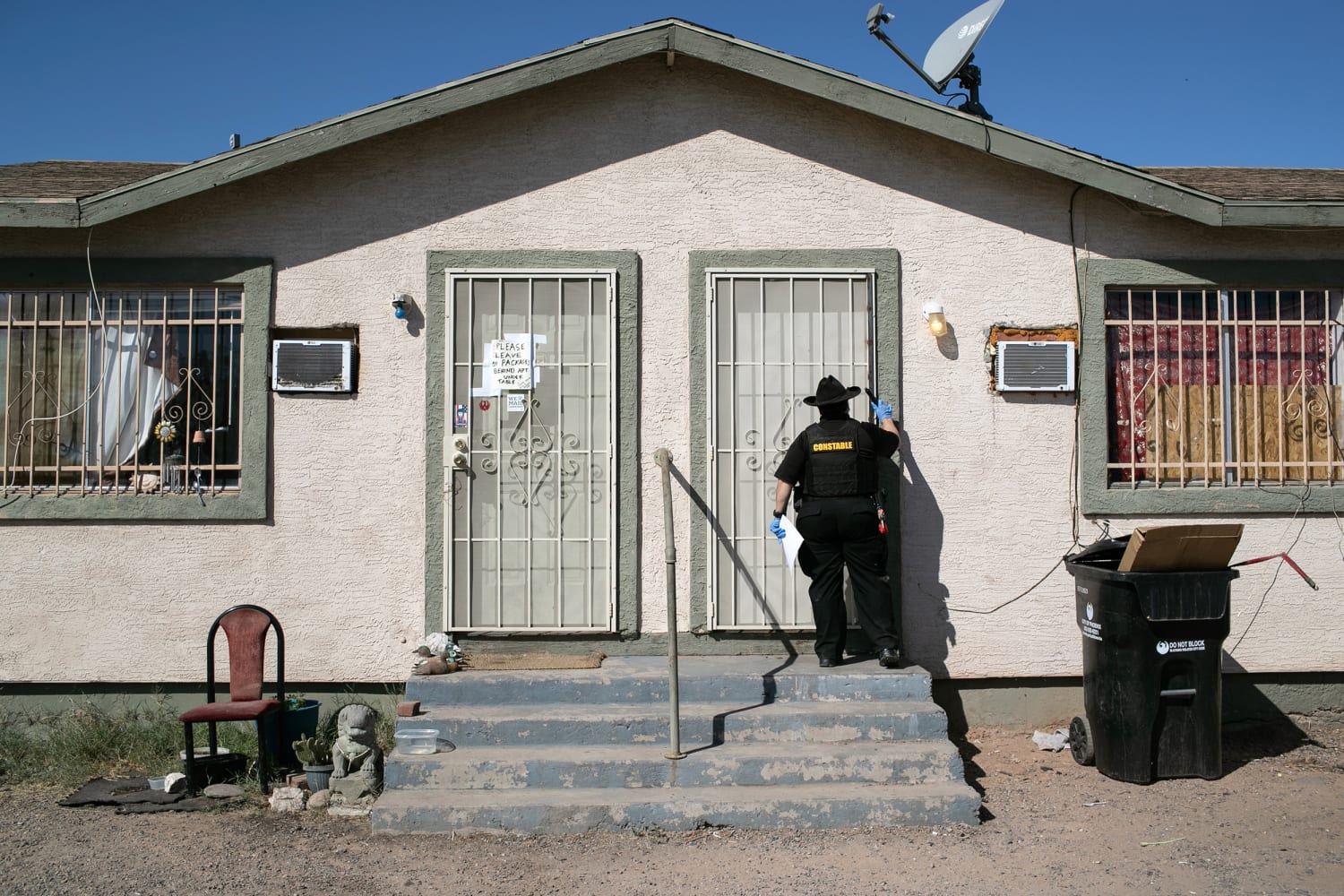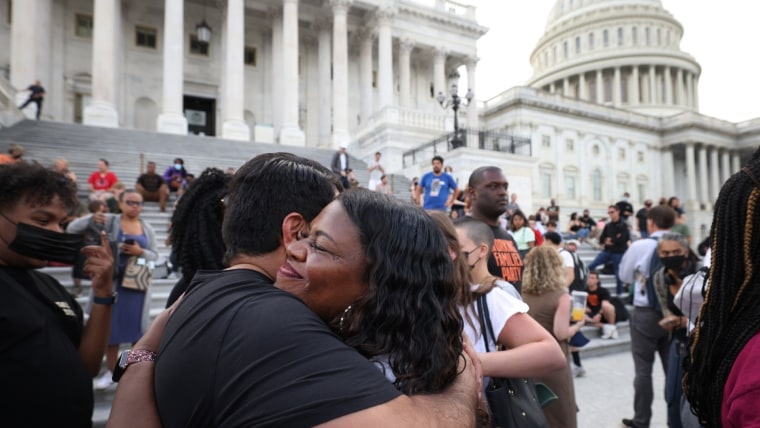The national eviction moratorium has been extended until October after a federal judge in Washington, D.C., on Friday rejected a request from landlords to put the move on hold. Despite significant popular support for the moratorium, its extension isn’t a clear-cut win for the public. Nobody wants to see people evicted from their homes, especially under these economic and public health conditions, but the mechanism used to help these tenants could come at the cost of further politicizing the Centers for Disease Control and Prevention and undermining the rule of law.
Government agencies have to stay within the bounds of their legal authority or otherwise we are at risk of abuse of power, even if the usurpations appear to be for benevolent ends.
In pushing the CDC to take this action, President Joe Biden appears to be walking back a promise: to not subject the CDC to political pressure. “I do not tell any scientists what they should do. I do not interfere,” he said at a televised town hall last month. He and the White House made the same commitment when it came to CDC leadership, saying they would only act where they had the legal authority to do so.
These assurances are so crucial because they follow a period of CDC politicization under the Trump administration. Wide swaths of America came to doubt its directives, as well as those of other federal health officials, as politically appointed communications professionals intervened in the regular scientific reports about the outbreak. This was particularly troubling because it happened during a pandemic when trust in health agencies and adherence to public health measures were literally issues of life and death.
So it is critical in this climate to ensure that the CDC appears unbiased by political considerations, as its recommendations increasingly split Americans in desperate need of Covid-19 information and guidance along party lines. Yet, the eviction policy looks like a case of the CDC finding a legal justification for a policy outcome at the precise moment it needed one to get a Democratic president out of a jam and to absolve a Democratic Congress of its responsibility to legislate.
The moratorium on evictions was originally supposed to end June 30. The previous extension from June 30 to July 31 was intended to allow for rental assistance to get to the millions of people who were behind on rent due to the Covid economic collapse. Only a fraction of the money has made it into renters’ hands, however, putting them at risk of homelessness.
With many renters still afraid of losing their homes, in part because the money still hadn’t reached many of them, pressure mounted late last month to further extend the moratorium through August, even though the CDC indicated the July extension would be the last. But Biden couldn’t have been clearer in promising not to use the CDC for political ends as the agency mulled a second extension.
“I told them I want them to take a look. I didn’t tell them what they had to do,” he said. “I told you I would not tell the Justice Department or the medical experts, the scientists what they should say or do, so I don’t want to get ahead of the CDC.”
But the timeline argues otherwise. Beyond its signaling that it wouldn’t extend the moratorium, there were growing questions about whether the agency even had the power to continue it unilaterally. When Supreme Court Justice Brett Kavanaugh cast the deciding vote in June turning down a previous request from landlords seeking to end the eviction pause, he said he was only upholding the policy because the administration was about to let it lapse “in only a few weeks.”
Days before the expiration of the July moratorium, Biden asked Congress to pass legislation extending it. What he got instead was a fierce backlash from progressives, especially in the House. Rep. Cori Bush, a Missouri Democrat, slept outside the Capitol in a dramatic protest until the administration acted, since lawmakers couldn’t line up the votes quickly enough to make it happen themselves.
“The message of the day is the White House needs to get its act together and extend the eviction moratorium. We do not want to hear the excuses about what will the court do, etc.,” Rep. Alexandria Ocasio-Cortez, D-N.Y., said in early August. Referring to February airstrikes in Syria, she continued: “The administration had no problem with what their authorities were when they decided to authorize military strikes without congressional authorization and informing Congress earlier this year.”
But the administration feared the Supreme Court could end up striking down even more of its Covid emergency actions if it unilaterally extended the moratorium and noted (correctly) that the executive branch didn’t have that power.. “To date, the CDC director and her team have been unable to find legal authority, even for a more targeted eviction moratorium that would focus just on counties with higher rates of Covid spread,” Biden’s senior adviser Gene Sperling told reporters at a White House daily press briefing Aug. 2. “I would say that on this particular issue, the president has not only kicked the tires; he has double, triple, quadruple checked.”
Then lo and behold, as the pressure continued to rise on Biden, the next day the CDC miraculously found the authority to do just that. The agency said it applied only to high-transmission areas despite Sperling saying the option wasn’t legally tenable — though, in any case, by one estimate, it would apply to 80 percent of U.S. counties and 90 percent of the population. The updated legal justification wasn’t much different than the old one — with the virus spreading and sheltering in place advised for the infected, it was dangerous to displace people from their homes — with the delta variant thrown in.
The federal judge who ruled against the landlords Friday has already signaled that she doesn’t find the revised legal rationale persuasive. She essentially said Friday that she thought what the CDC did was illegal, but she’s still bound by the Supreme Court decision allowing the moratorium for the time being.
Biden himself hasn’t exuded much confidence in this newly discovered legal authority. “Constitutionally, the bulk of the constitutional scholarship says that it’s not likely to pass constitutional muster,” he said shortly before the updated moratorium was rolled out. Biden came awfully close to saying that he expected it to be struck down, but that the new rules and resulting litigation would buy time for the federal government to get its act together. Though he has walked the comment back slightly, that is as bad for the rule of law as making the CDC look like a partisan operation is for public health.
Government agencies have to stay within the bounds of their legal authority or otherwise we are at risk of abuse of power, even if the usurpations appear to be for benevolent ends. Whatever powers the Biden administration claims today can be exercised by someone with different ideological objectives — such as a second Trump administration — tomorrow. Under our system, Congress makes the laws and the executive branch carries them out, not the other way around.
The legally preferable alternative is for Congress to pass a law on pandemic evictions, as it had done previously before failing to renew the policy. When then-President Donald Trump issued his executive order to provide some relief from evictions after that failed renewal, it was regarded as inadequate in actually preventing evictions.
Another option, which helps renters in a manner less damaging to property owners, is for all layers of government to get better at distributing the assistance that was already authorized for cash-strapped tenants. In the waning days of the old moratorium, only 12 percent of the $25 billion lawmakers approved in December had been received by people who needed the funds.
The whole situation is reminiscent of the Deferred Action for Childhood Arrivals program created under Biden’s onetime boss, former President Barack Obama. Obama repeatedly denied he had the legal authority to shield young people who lack legal immigration status from deportation without an act of Congress. Such action was not forthcoming and progressives demanded the president do something.
Like stopping evictions, the underlying policy of stopping deportations of sympathetic people has substantial public support, though in both cases there are limits. But voters, especially independents, don’t like government overreach either. By acting through legally contested executive action with no clear statutory authority, the intended beneficiaries are left in limbo and at the mercy of the courts.
Obama’s executive order strategy didn’t solve the problem in any enduring way, exposing DACA recipients to the risk of reversal by a future court or administration, deepening the partisan rancor over immigration and contributing to a sense that the program was an illegal use of executive authority.
With Democrats in control of both houses of Congress, however narrowly, Biden does not have to repeat Obama’s mistake. He can keep his promise to depoliticize public health and honor his oath of office.
Source: | This article originally belongs to Nbcnews.com










